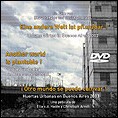Another world is plantable - Part 1
- Order number: OEK10013
Format: PAL, Stereo
Duration: 30 minutes
Aspect Ratio: 4:3
Languages: German with English or Spanish subtitles
Production: Ella von der Haide, Christoph Arndt
Year of Productionr: 2003
Director: Ella von der Haide, Christoph Arndt
In the film series „Another world is plantable!“ young filmmaker Ella von der Haide presents community gardens worldwide. In the center of the series there are activists of community gardens, their gardens and visions. They tell us why their gardens are not just green oasis in the middle of the cities, but also projects which realize "another world".
Part One of the series shows community gardens in Buenos Aires.

Daniel und Valeria, Neighbourhood garden La Bocca
Right in the densely populated heart of Buenos Aires, there have arisen since the mid-nineties ever more ecologically managed fruit and vegetable gardens. In addition to individual household and family gardens, there are also a number of gardens that have sprung up as the community projects of the most diverse groups: organizations for the homeless, people’s kitchens, and neighborhood consortiums. The land is obtained, sometimes through strugggle; it is reclaimed, planted, and finally the yield is shared.

Community gardener San Telmo, Buenos Aires
Military dictatorship, neoliberalism, and the economic crisis of 2001 have all left their mark on Argentine society. The garden projects are part of a societal development that has arisen beyond the confines of the state and that seeks grass-roots democratic alternatives. In this way community gardens respond to human needs not only materially through the production of ecological foods, but also help to rebuild the social safety net and actively to bring into being political and economic utopias.
In the film, the gardeners from two different garden projects relate their political aims and ideas as well as their experiences in their daily work with plants. The first project is MTD (the Movement of Unemployed Works) Claypole, the other is the Assamblea (Neighborhood Initiative) La Bocca
A Film by Ella von der Haide and Christoph Arndt
Buenos Aires, 2003






